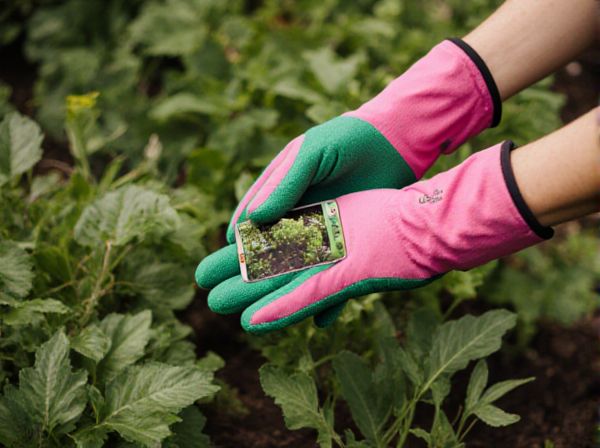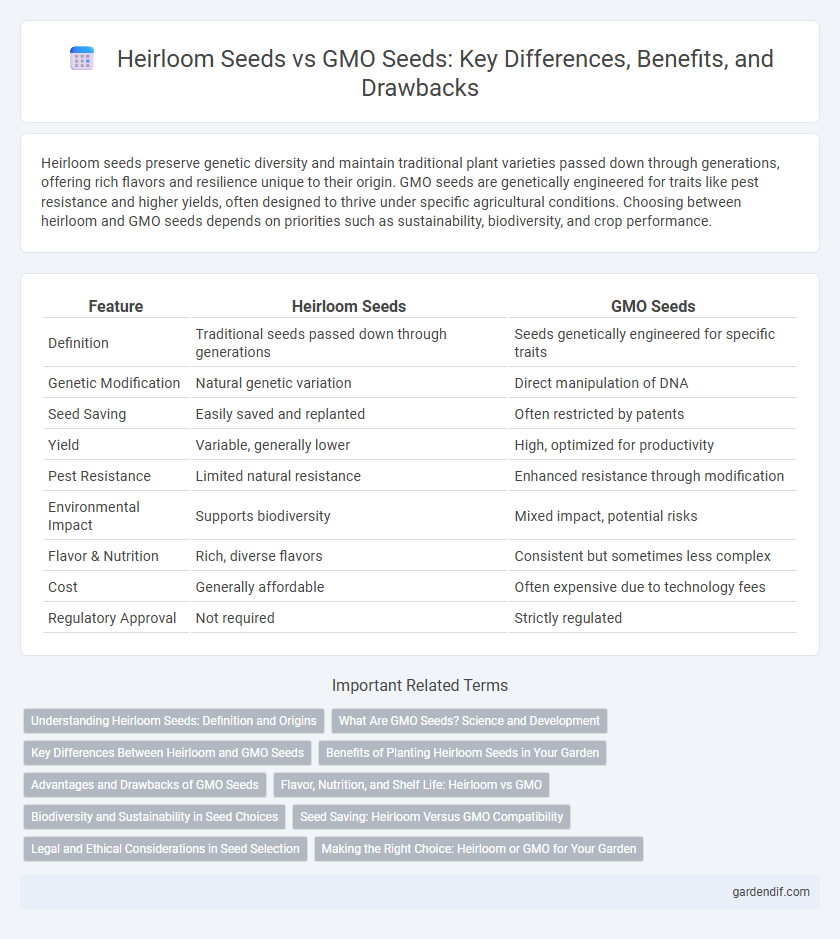
Heirloom vs GMO Illustration
Heirloom seeds preserve genetic diversity and maintain traditional plant varieties passed down through generations, offering rich flavors and resilience unique to their origin. GMO seeds are genetically engineered for traits like pest resistance and higher yields, often designed to thrive under specific agricultural conditions. Choosing between heirloom and GMO seeds depends on priorities such as sustainability, biodiversity, and crop performance.
Table of Comparison
| Feature | Heirloom Seeds | GMO Seeds |
|---|---|---|
| Definition | Traditional seeds passed down through generations | Seeds genetically engineered for specific traits |
| Genetic Modification | Natural genetic variation | Direct manipulation of DNA |
| Seed Saving | Easily saved and replanted | Often restricted by patents |
| Yield | Variable, generally lower | High, optimized for productivity |
| Pest Resistance | Limited natural resistance | Enhanced resistance through modification |
| Environmental Impact | Supports biodiversity | Mixed impact, potential risks |
| Flavor & Nutrition | Rich, diverse flavors | Consistent but sometimes less complex |
| Cost | Generally affordable | Often expensive due to technology fees |
| Regulatory Approval | Not required | Strictly regulated |
Understanding Heirloom Seeds: Definition and Origins
Heirloom seeds are open-pollinated varieties passed down through generations, preserving unique genetic traits and regional adaptations. These seeds maintain biodiversity and cultural heritage by allowing farmers to save seeds year after year without genetic modification. Unlike genetically modified organisms (GMOs), heirloom seeds are naturally bred through traditional farming practices without engineered alterations.
What Are GMO Seeds? Science and Development
GMO seeds are genetically modified organisms created by scientists to introduce specific traits such as pest resistance or drought tolerance into crops. This process involves altering the seed's DNA through biotechnology techniques like gene splicing to enhance yield, nutritional value, or adaptability. Unlike heirloom seeds, which are open-pollinated varieties passed down through generations naturally, GMO seeds undergo precise genetic engineering to achieve targeted improvements.
Key Differences Between Heirloom and GMO Seeds
Heirloom seeds are open-pollinated, genetically stable varieties that preserve traditional traits and flavors, while GMO seeds are genetically engineered for specific traits like pest resistance or increased yield. Heirlooms promote biodiversity and seed saving, whereas GMOs often involve patented genes and reduced genetic diversity. The choice impacts agricultural sustainability, crop resilience, and consumer preferences.
Benefits of Planting Heirloom Seeds in Your Garden
Heirloom seeds offer unique genetic diversity, preserving rare plant varieties that provide robust flavors and nutritional profiles unmatched by GMO counterparts. Planting heirloom seeds supports sustainable gardening by promoting natural adaptation to local climates, reducing dependency on chemical inputs. These seeds enable gardeners to save and share seeds easily, fostering community resilience and agricultural heritage preservation.
Advantages and Drawbacks of GMO Seeds
GMO seeds offer significant advantages such as enhanced resistance to pests, diseases, and environmental stress, which leads to higher crop yields and reduced reliance on chemical pesticides. However, drawbacks include potential long-term environmental impacts, gene flow to non-GMO crops, and concerns about biodiversity loss. Economic dependency on seed manufacturers due to patent restrictions is another critical consideration for farmers using GMO seeds.
Flavor, Nutrition, and Shelf Life: Heirloom vs GMO
Heirloom seeds produce fruits and vegetables prized for their superior flavor and rich nutritional profiles, often containing higher levels of antioxidants and vitamins compared to GMO counterparts. GMO seeds are engineered primarily for extended shelf life, pest resistance, and uniformity, which can sometimes result in compromised taste and reduced nutrient density. While heirlooms offer robust taste and health benefits, GMO crops provide advantages in durability and longevity during storage and transportation.
Biodiversity and Sustainability in Seed Choices
Heirloom seeds preserve genetic diversity by maintaining traditional, non-hybridized plant varieties that adapt naturally to local environments, enhancing ecosystem resilience. GMO seeds, engineered for specific traits like pest resistance or herbicide tolerance, can reduce biodiversity by promoting monoculture practices and dependence on patented seeds. Choosing heirloom seeds supports sustainable agriculture by fostering diverse crop ecosystems and reducing chemical inputs, crucial for long-term soil health and environmental balance.
Seed Saving: Heirloom Versus GMO Compatibility
Heirloom seeds offer superior seed saving compatibility due to their open-pollinated nature, allowing gardeners to harvest and reuse seeds with consistent traits across generations. GMO seeds are typically engineered for specific traits and often come with genetic restrictions or patents that inhibit saving and replanting. This fundamental difference makes heirloom seeds a reliable choice for preserving plant genetics and promoting biodiversity in seed saving practices.
Legal and Ethical Considerations in Seed Selection
Heirloom seeds often carry legal advantages due to fewer patent restrictions compared to genetically modified organisms (GMOs), which are frequently patented and subject to licensing agreements. Ethically, heirloom seeds promote biodiversity and preserve cultural heritage, while GMO seeds raise concerns about corporate control over food systems and potential environmental impacts. Farmers must navigate intellectual property laws and consider long-term ecological sustainability when selecting between heirloom and GMO seeds.
Making the Right Choice: Heirloom or GMO for Your Garden
Choosing between heirloom and GMO seeds depends on your gardening goals, with heirloom seeds offering genetic diversity, traditional flavors, and open-pollinated traits ideal for seed saving and sustainability. GMO seeds provide targeted benefits such as pest resistance, herbicide tolerance, and increased yield, often developed through precise genetic modifications. Assess factors like environmental impact, crop performance, and personal values to make an informed decision for your garden's health and productivity.
Heirloom vs GMO Infographic

 gardendif.com
gardendif.com